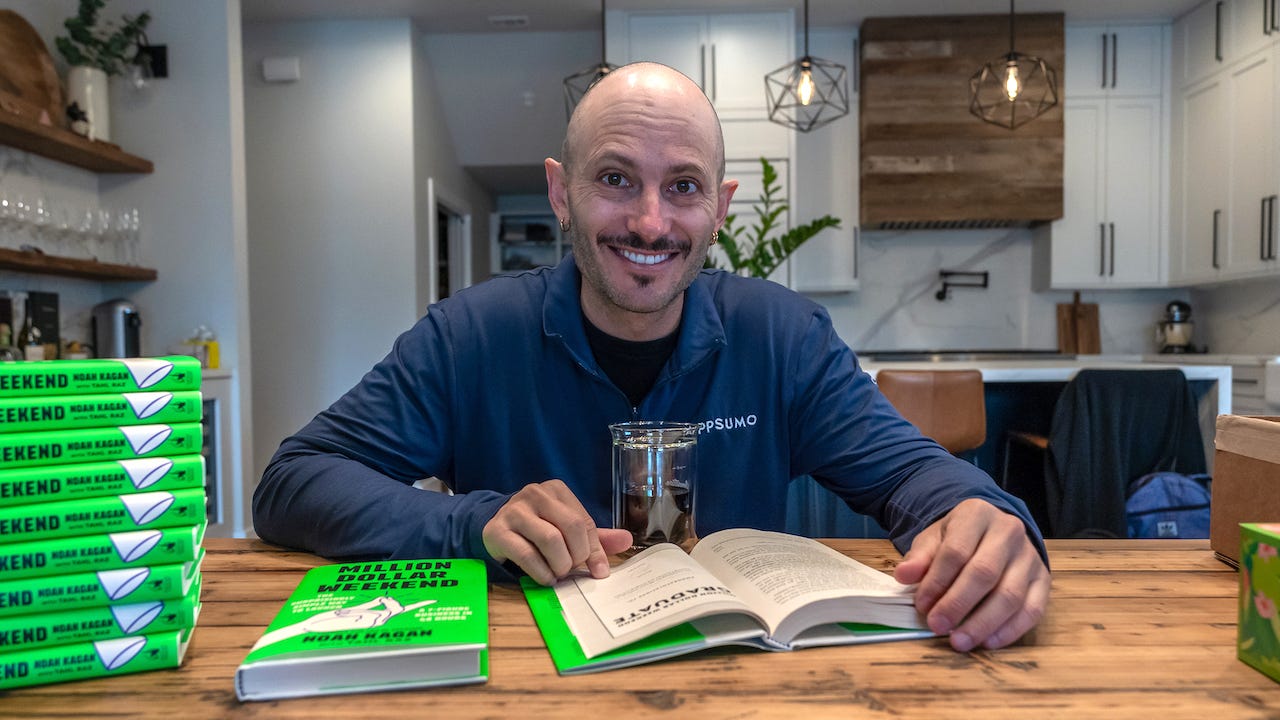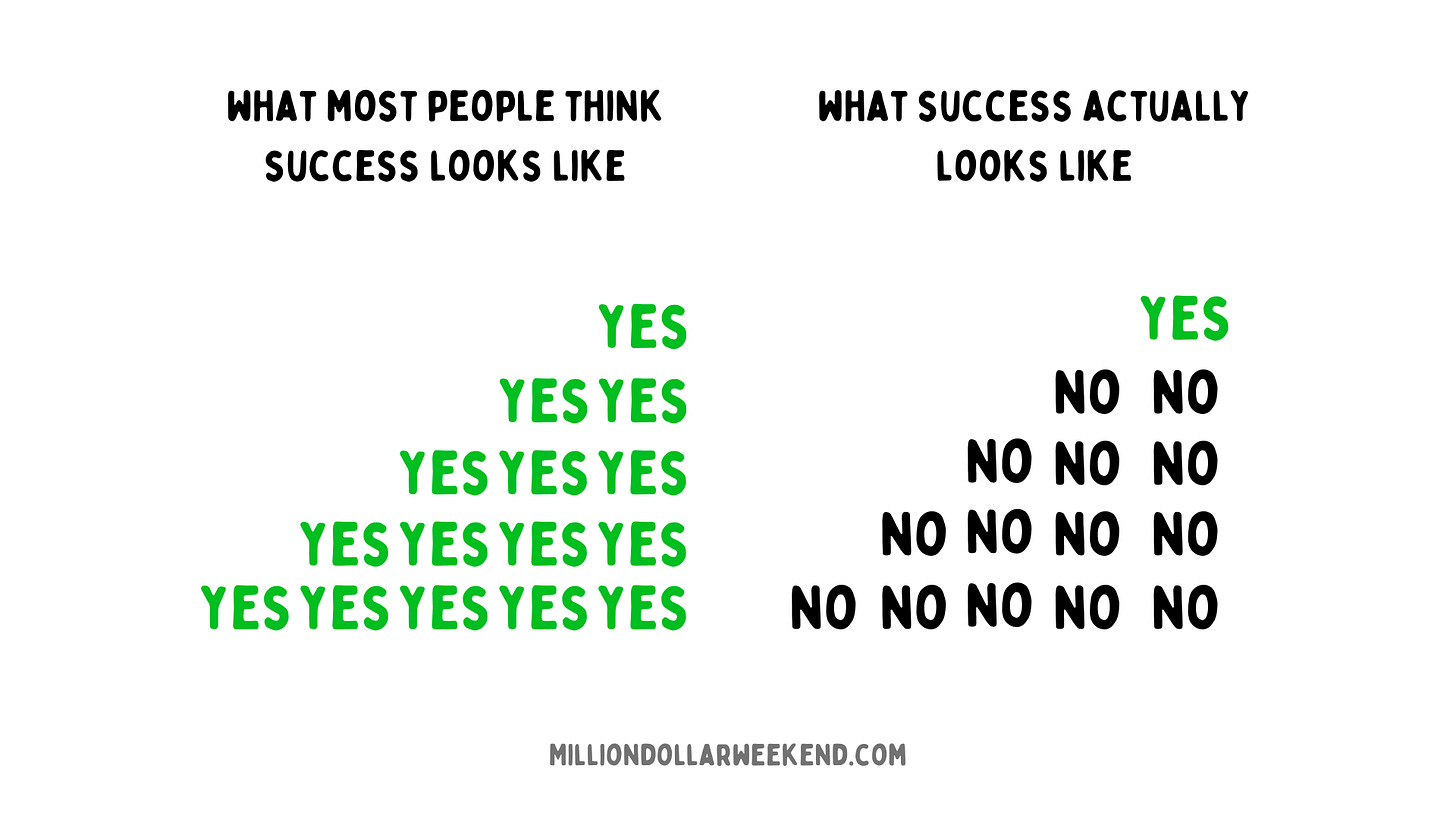Noah Kagan (AppSumo): The Least Risky Way to Start Your Business This Weekend
Why everyone should consider starting a business, the unlimited upside of asking, and how to find your million-dollar idea
Dear subscribers,
Today, I want to share how you can start a business in the least risky way possible.
Noah Kagan is the CEO of AppSumo ($100M ARR) and author of Million Dollar Weekend. He was also employee #30 at Facebook. Noah and I talked about:
“Now not how” to start a business this weekend
The unlimited upside of asking and the 48-hour money challenge
How to find and validate your business idea
Noah is one of the OG creators that I’ve always looked up to. Let’s dive in.
“Now not how” to start a business this weekend
Welcome Noah! You wrote the only business book that made me want to stop reading and start building something halfway through.
Thanks so much! That’s the greatest compliment that I can get. 😅
Many of my readers are tech workers who are anxious about layoffs — do you have any advice for them?
I’ve been fired twice early in my career. It made me realize that my livelihood wasn’t in my control. My message to your readers is that:
Right now is the easiest time to start your own business.
Everyone reading this should start planting the seed now to start something.
But don’t you have to go all in to start a business? Silicon Valley celebrates founders who quit their jobs, raise money from VCs, and go big.
I don’t think you need to do any of that to start a business. Two quick examples:
Mailchimp started as a lifestyle business and was recently acquired for $12B.
I bootstrapped AppSumo in 2010 and we’ll do $100M in sales this year.
People make so many excuses about this like “I need a technical co-founder.” or “I don’t have a business idea.” My message to them is now not how.
Don’t spend a year building a prototype only to struggle to get customers. Instead:
Get paying customers before you launch and then build what they want.
I’d love for you to break down how that works but let’s first go through some excuses that my readers are making. Here’s excuse #1:
“I’m already making $500K+ in my tech job. Why should I start a business?”
Well, it’s risky to have your tech job be 100% of your livelihood. As we’ve seen, you could be a star employee and still lose your job because of the market.
Everyone has car insurance. So why not also have job insurance? To me, the #1 job insurance is entrepreneurship, but there’s a catch:
It takes time to get rich off your own business.
So it’s best to start today and stick with it over a long period.
Ok but what if "I just don’t have time to start a business. I’m in meetings all day and have family duties at night.”
Spend 15 minutes now to write out what you want your schedule to look like a few years from now. Then reflect on where you are at today and how you might get there.
One of the biggest things I notice when I speak with people is they don’t believe they can live their dream life.
Don’t fall into that trap. Write out your dream schedule and then make it happen!
I have a friend who’s a busy software engineer at Google with a wife and two kids. He still spends an hour every Saturday building his own side business.
Most tech folks have some time in the morning or on the weekend. Have a clear dream about what your future could look like and prioritize your time to achieve it.
Ok one last excuse: “It’s just too hard for a side business to support my expensive Bay Area mortgage. We’re talking about $10,000+ a month.”
That’s funny. In my book, I have a concept called the Freedom Number, which is how much you have to make in a month to be able to do whatever you want with your life.
Don’t quit your day job and go all in. Build a side hustle alongside your day job and jump ship only if you want to. The Bay Area Freedom Number is high but still achievable.
But isn’t it a lot of work to have a day job and build a side hustle at the same time?
It is a lot of work so don’t be too harsh on yourself.
If you have a demanding tech job and are still building something on the side, give yourself some credit. You’re building your dream. Start now, stick with it, and you’ll be surprised at how far you can get in a few years.
Do you have an example of a person who did this?
Sure, for example, a friend of mine worked for the semiconductor industry while building a seven-figure e-commerce business on the side. Years later, when he wanted more free time, he was able to quit his job and still maintain a significant source of income. So, it doesn't have to be an all-or-nothing approach – you can do both.
The unlimited upside of asking and the 48-hour money challenge
One of my favorite chapters in your book is about just asking for what you want. Can you share more about that?
Yes, most people don’t ask. They wish for it, they drop hints, and they hope. But the simple fact of business is that if you don’t ask for it, you won’t get it.
Of course, you have to ask the right way. Let me give you an example:
Kellan is our program manager at AppSumo. Instead of just asking me for a raise, she put together a two-page doc with her accomplishments, market comp comparisons, and where she wants to go next. As you can imagine, she got a big raise.
But how do you deal with asking for what you want and then getting rejected?
Learn to love rejections. Set rejection goals!
I remind myself: “This is going to suck but let me get at least 25 rejections.” I turn getting rejected into a game instead of a blow to my self-worth.
Here’s my challenge to your readers:
Validate your product before you build it by finding 3 customers in 48 hours who will give you their money for your idea.
Tell me more about this “48-hour money challenge.” Why do you think it works?
If you can’t get 3 customers in 48 hours, it only gets harder. You're looking for a ball that you can push downhill, not uphill.
People often think their problem is unique, but it's not. I've spent years and millions of dollars building things that no one wanted.
You shouldn’t have to convince people to buy your product. You should focus on solving a problem for them that they want to give you money for.
Can you walk through an example of when you did the “48-hour money challenge”? What were the specific steps that you took and the conversations that you had?
Sure, let me tell you about how I made $2,700 in a weekend by getting 27 people to pre-pay for an idea.







